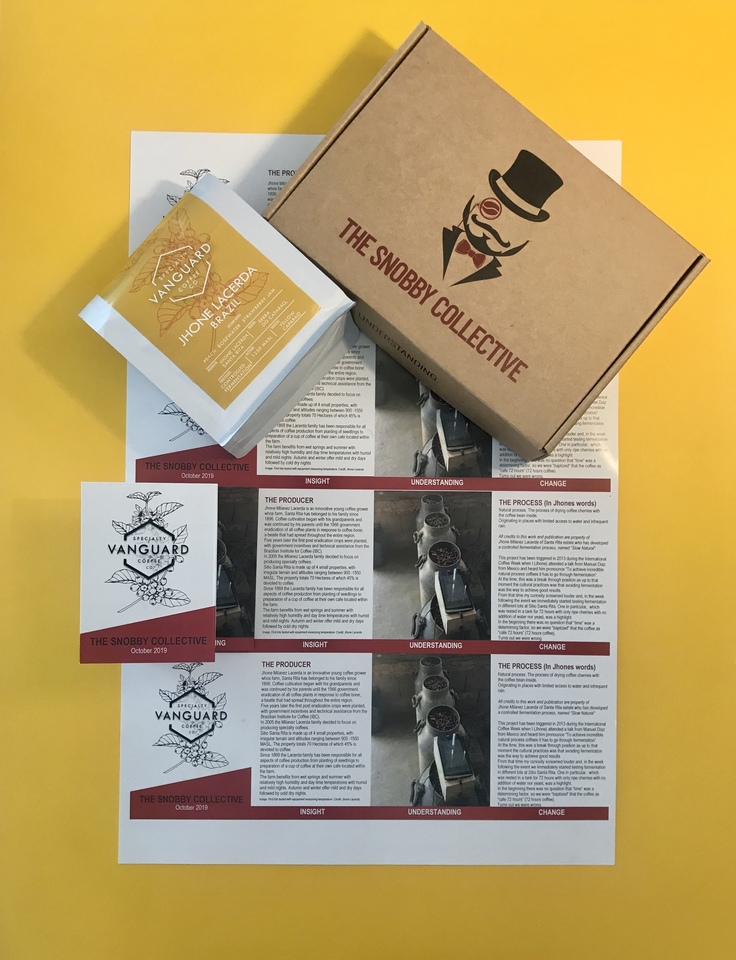October 2019
October 2019:
Vanguard Coffee Co. came through with another Yellow Caparao from Brazil (click here for our other stories on Yellow Caparao). This coffee represents innovation and passion at a producer level, which simply blew us away. A perfect way to round out our first year. Producer Jhone Lacerda wrote a 10 page report on the "Slow Natural" processing technique he had developed and this report was available to us via 3 brothers coffee who sourced the beans and Vanguard Coffee Co.
Our October feature focused on:
The Producer:
Jhone Milanez Lacerda is an innovative young coffee grower whos farm, Santa Rita has belonged to his family since
1896. Coffee cultivation began with his grandparents and was continued by his parents until the 1966 government eradication of all coffee plants in response to coffee borer, a beatle that had spread throughout the entire region. Five years later the first post eradication crops were planted, with government incentives and technical assistance from the Brazilian Institute for Coffee (IBC). In 2005 the Milanez Lacerda family decided to focus on producing specialty coffees. Sitio Santa Rita is made up of 4 small properties, with irregular terrain and altitudes ranging between 900 -1550 MASL. The property totals 70 Hectares of which 45% is devoted to coffee. Since 1869 the Lacerda family has been responsible for all aspects of coffee production from planting of seedlings to preparation of a cup of coffee at their own cafe located within the farm. The farm benefits from wet springs and summer with relatively high humidity and day time temperatures with humid and mild nights. Autumn and winter offer mild and dry days followed by cold dry nights.
The Process (In Jhones words):
Natural process. The process of drying coffee cherries with the coffee bean inside. Originating in places with limited access to water and infrequent rain.
All credits to this work and publication are property of Jhone Milanez Lacerda of Santa Rita estate who has developed a controlled fermentation process, named “Slow Natural”.
This project has been triggered in 2013 during the International Coffee Week when I (Jhone) attended a talk from Manuel Diaz from Mexico and heard him pronounce “To achieve incredible natural process coffees it has to go through fermentation”. At the time, this was a break through position as up to that moment the cultural practices was that avoiding fermentation was the way to achieve good results. From that time my curiosity screamed louder and, in the week following the event we immediately started testing fermentation in different lots at Sitio Santa Rita. One in particular, which was rested in a tank for 72 hours with only ripe cherries with no addition of water nor yeast, was a highlight. In the beginning there was no question that “time” was a determining factor, so we were “baptized” that the coffee as “cafe 72 hours” (72 hours coffee). Turns out we were wrong.
The Challenge:
To attain consistency, Jhone had to identify reliable parameters that could be reproduced.
Some of the variables Jhone had to consider, control or account for included:
-Temperature: Night time temperatures of a May harvest may reach lows of 4 degrees, where as October its 20 degrees at night.
-Altitude: Caparao is a highly mountainous region where selective harvest runs between May and December / January.
Through many successful and not successful trials, it was identified fermentation time was NOT the factor to focus on.
Temperature, however was the factor that yielded consistent results, which provided another challenge. How to monitor the
temperature during the entire fermentation process, day or night and in real time?
After much research and not many options, Jhone was faced with developing his own equipment. With the help of an enthusiastic computer programmer and several research and analysis phases, they developed an APP that would measure temperature and allow monitoring via a smart phone. In addition,
sending a text alert when optimum fermentation was reached.
Fermentation profiles were then developed, through much trial and error these lots were dried, milled, roasted and cupped.
In 2015, 4.5 60kg bags of this coffee were produced, followed by 55 bags in 2016 and 103 bags in 2017. During 2018, 3 different lots, 43 degrees, 45 degrees and Natural (no controlled fermentation) were produced.
Photo credit: Jhone Lacerda
|
© Copyright Derelict Coffee Roasters |


